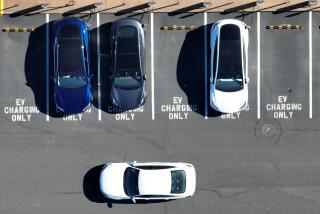Advisers Pressuring Clinton to Increase Gasoline Tax
- Share via
LITTLE ROCK, Ark. — Although he has expressed grave reservations about it in the past, President-elect Bill Clinton is coming under strong pressure from close advisers to increase the tax on gasoline as an environmentally beneficial way to raise revenue needed for deficit reductions.
The idea figured prominently at this week’s two-day economic conference in Little Rock, Ark., where it was advocated by Alice Rivlin, Clinton’s choice for deputy budget director, Felix Rohatyn, the New York financier and sometime-Clinton adviser, business leaders and others.
Vice President-elect Al Gore favored higher gas taxes in his book, “Earth in the Balance,” while Sen. Lloyd Bentsen (D-Tex.), the Treasury secretary-designate, and Rep. Leon E. Panetta (D-Carmel Valley), the budget director-designate, have favored gas tax hikes on occasion in the past.
Last week, the Progressive Policy Institute, a centrist think tank that championed Clinton’s candidacy, published a book of advice to the new President that called for a “moderate” gas tax increase.
While Clinton said Tuesday that he would not enact a gas tax increase unless he were persuaded it was fair to middle-class taxpayers, he noted he had raised gas taxes during his years as Arkansas governor.
The upshot is that gasoline taxes, once thought to run afoul of Clinton’s often-stressed concern about the middle-class tax burden, now appear to be re-emerging as at least a potential element of his economic plan.
Dawn Erlandson, director of tax policy for the environmental group Friends of the Earth, said transition officials told her not long ago that they would consider “any revenue source--but that the gas tax was not on the table.”
“So this is new,” she said.
Advocates argue that the tax, while never popular, has several points to recommend it. It is a relatively simple way to generate revenue and, at higher levels, will dampen demand for oil and cause drivers to choose more fuel-efficient cars. Each added penny of gasoline tax can generate about $1 billion in revenue.
Supporters of the tax point out that adjusted for inflation, gasoline prices are now as low as they have been in more than 20 years. Federal gasoline taxes are now 14.1 cents per gallon; state gas taxes average about 20 cents a gallon.
In addition to providing much-needed sources of revenue to help fund some of Clinton’s ambitious agenda, a gas tax would solve a political problem for him as well. By causing motorists to choose more fuel-efficient cars, a high gas tax could relieve the government of the necessity of forcing auto makers to build such vehicles through legislation.
During last winter’s primary campaign, Clinton denounced former Sen. Paul E. Tsongas’ plan for a 50-cent-a-gallon gas tax. He has since moderated his criticism, but has continued to insist that a high tax would be unfair to the middle-class taxpayers he believes are already shouldering too much of the tax bill.
At the Tuesday press conference that closed the economic meeting, Clinton said “a lot of good arguments were made for the gas tax today, and for consumption taxes generally. But, I don’t think that we should be doing anything to aggravate the inequalities of the last decade.”
George Stephanopoulos, Clinton’s director of communications, Wednesday pointed to Clinton’s concern about the tax fairness issue, but noted there were several ways to offset the impact of a gas tax on middle-income taxpayers. Tax writers could couple it with a rollback in Social Security or income taxes to make sure that it reduced, or at least did not increase, those taxpayers’ bills, he said.
Stephanopoulos declined to further characterize Clinton’s view on the tax, except to say that the President-elect “listened hard” to all that was said at the conference.
If he did, he heard the proposal over and over again.
Among its advocates were Jessica Tuchman Mathews of the World Resources Institute, a friend of the vice president-elect.
In her presentation, Mathews made a point echoed by others at the conference: that the government is better off taxing activities it wants to discourage, such as pollution, instead of activities it wants to encourage, such as the earning of wages.
Other supporters at the conference were Paul O’Neill of Aluminum Co. of America, Drew Lewis of Union Pacific Corp., and Harold A. Poling of Ford Motor Co., who called for a phased-in 25-cent-a-gallon tax over three to five years.
Clinton’s new Cabinet apparently does not include staunch foes of gas taxes so far. While Bentsen opposed gasoline taxes early in his career, he more recently has found them acceptable in some circumstances. As Treasury secretary, he won’t need to be as worried about the concerns of his former Texas constituents.
Three ranking Clinton aides also signed on to the gas tax idea last week when they endorsed the report of the National Commission on the Environment, a nonpartisan environmental group. The aides were Madeleine M. Kunin, a member of the Clinton transition board, Douglas M. Costle, who heads the transition group studying federal energy operations; and James Gustave Speth, who heads the group studying federal activities related to natural resources.
Gas taxes fall disproportionately on people in rural areas and the West, who generally must travel longer distances. But while most surveys show Americans oppose higher gas taxes, some have shown voters will accept even sharply higher gas taxes for a good cause, such as the rebuilding of roads and bridges.
More to Read
Get the L.A. Times Politics newsletter
Deeply reported insights into legislation, politics and policy from Sacramento, Washington and beyond. In your inbox twice per week.
You may occasionally receive promotional content from the Los Angeles Times.











